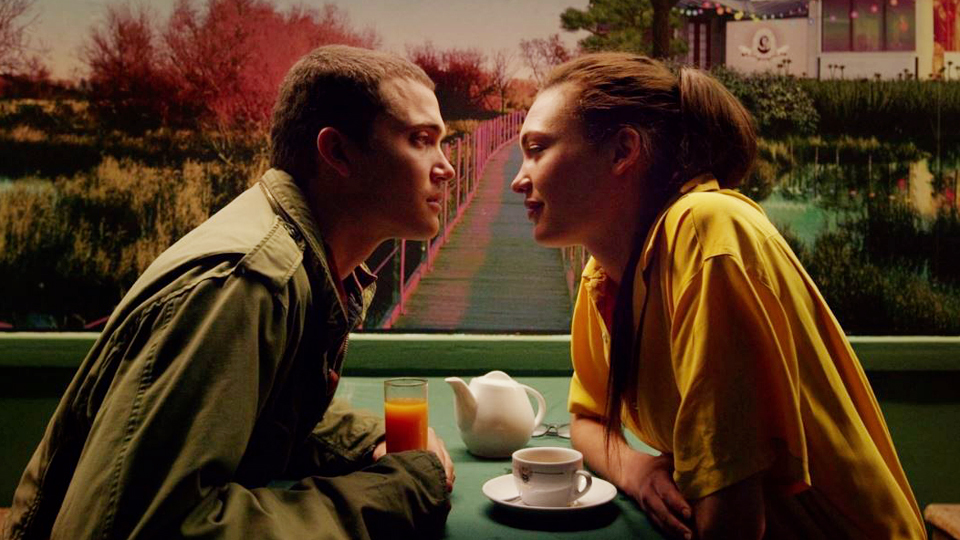Since its super NSFW promotional posters were released in May, the world has been eagerly anticipating Gaspar Noé’s forthcoming film, Love. The 3D erotic epic (which will be released in US cinemas this Friday) follows Murphy, a film school student whose ex-girlfriend, Electra, has disappeared. The film pieces together the pair’s ill-fated relationship through a series of flashbacks chronicling the parties, drugs, sex, and tenderness that formed their bond. Last night at New York’s NeueHouse, Noé discussed the film in a conversation that spanned from his leading man’s failed weight gain to 90s New York cult classic Kids‘ influence on his modern Parisian love story. Here are the most surprising things we learned.
In Eastern Europe, Love is a political tool: Earlier this year, French conservative groups successfully lobbied to re-rate Love from 16+ to a harsher 18+. This decision prompted Noé to speak out about censorship’s threat to freedom of expression in film and last night, he revealed an instance of that freedom in action. After Love premiered at the Moscow Film Festival, Russia’s Minister of Culture called for its outright ban. “[The Russian government] said they had to protect their youth from images like this, that my movie is as dangerous as Mein Kampf,” Noé said. But in neighboring Ukraine, this controversy became diplomatic. “The age of consent in Ukraine is 16, but they invented a special 20+ rating for the movie and played it in one theater out of eight in the whole country. Perhaps it’s to show to the Russians how free they are,” said Noé.
But he’s stoked on America’s system: Between bans and arbitrary age restrictions, Noé is happy to release Love in America this Friday, where it remains unrated. “All my movies have been released unrated in the United States. Not many countries have a system like that and it’s one thing I really like about America,” he said.
Film criticism needs more diversity: In spite of its international ratings roulette, Love has enjoyed a positive reception, according to Noé. Yet “some reviews of the movie are so hateful,” he said, adding “but mostly, they’re written by older men.” This leaves us to wonder how the discourse around Love would differ if there were more diverse voices and perspectives in film criticism.
He questioned our perceptions of real life love: Perhaps Noé’s most interesting takeaway from his critics’ sensationalism was just how desensitized we’ve become to not only extreme pornography on the internet, but to violence in general. “This movie turned out to be more problematic in most countries than Irréversible,” Noé revealed of his film that Roger Ebert called “so violent and cruel that most people will find it unwatchable.” “Violence seems easier to digest for Western societies than images of regular people touching — these extreme images are disconnected from most people’s normal life,” said Noé.
New York got a little love, too: Noé has spoken about how the softcore 70s porn VHS tapes he enjoyed as an adolescent impacted the high tech film’s aesthetic. But last night, Noé threw 90s New York in the mix with a shout out to Kids, Larry Clark’s provocative portrait of teen sexuality. “If I have to think of movies with sexual images, there’s still something fresh in Kids — something more generational,” he said.
He was feeling a little Blue: Though Noé gave a shout out to the Lower East Side, it was a more recent French love story that inspired the film’s most tender moments: Blue is the Warmest Color. “Whether the sex scenes were simulated or not, what I was the most obsessed about were the kissing scenes. The way they touched each other was so believable,” Noé said. “When you think of your personal love story, the image that really come to your mind is kissing.”
They winged the pillow talk: Though Love is full of heartfelt lines and a few funny jokes, Noé assured every line of the film was off the cuff. “There was a script that was seven pages long, but it was more like a treatment. It had sixty scenes but no dialogue at all,” said Noé. “Absolutely all of the dialogue was improvised on the set.”
The director doubled as a stylist: Although Noé’s male protagonist is slightly autobiographical, the director said he still felt a little “isolated” from his leading man — so he raided his own wardrobe. “I gave him my clothes, some t-shirts, and also my mother’s family name, Murphy,” he said. But even in Noé’s plaid shirt uniform, Murphy still didn’t feel like his alter ego — more like his “little problematic brother.”
And there was one problem in particular: Speaking about the duration of filming, Noé revealed he had to take a two month break from shooting so that lead actor Karl Glusman could gain weight for the film’s scenes set in the present day. That plan was derailed when Karl found love IRL. “He promised he’d eat like 20 cheeseburgers a day, but he fell in love with a girl while shooting,” Noé said. His new boo wasn’t happy when he had to pack on the pounds, and their, “rehearsals” kept Karl too slender. “He was spending all this time in her room… he didn’t really get that fat,” joked Noé.
Credits
Text Emily Manning
Image via YouTube
